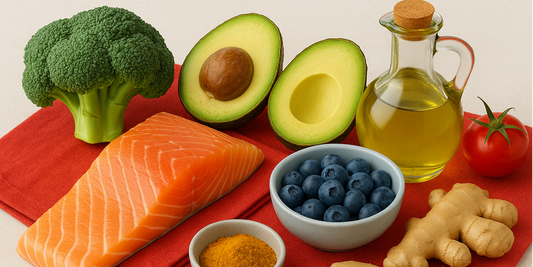
The Best Anti-Inflammatory Foods for Joint and Muscle Health
Share
Inflammation plays a much bigger role in your everyday health than you might think, especially when it comes to how your joints and muscles feel. Whether you’re managing arthritis, recovering from surgery, or simply noticing more stiffness as you age, what you eat can directly affect how you move, how you feel, and how quickly you heal.
Gentle movement and smart nutrition go hand in hand. Today, let’s explore how anti-inflammatory foods can support your joint and muscle health, one bite at a time.
Understanding Inflammation: What It Is and Why It Matters
1 - Acute vs. Chronic Inflammation
Inflammation isn’t always harmful. When you twist your ankle or catch a cold, inflammation is your body’s natural way of healing. This is called acute inflammation. However, when inflammation becomes chronic, often caused by poor diet, stress, or aging, it can do more harm than good. That’s when swelling, stiffness, and pain start interfering with your daily life.
So, what causes joint and muscle inflammation? Aging is a natural factor. As we grow older, our body’s ability to repair itself slows down, causing inflammation to last longer. Other common triggers include injury, overuse, autoimmune conditions like arthritis, and even lack of movement. In fact, sitting too much can make inflammation worse.
2 - Why Inflammation Control Matters
Chronic inflammation in your joints and muscles doesn’t just cause discomfort. It can also limit mobility, making it harder to stay active. Managing inflammation through your diet can help you move more freely, recover faster, and live more comfortably.
Top Anti-Inflammatory Foods to Add to Your Diet
Your kitchen might just be your best pharmacy. The following foods are rich in nutrients that naturally reduce inflammation and support joint and muscle function.
Fatty Fish (Salmon, Mackerel, Sardines)

These fish are high in omega-3 fatty acids, which help reduce the production of inflammatory compounds. Try grilled salmon or sardine salad for a tasty anti-inflammatory meal.
Leafy Greens (Spinach, Kale, Swiss Chard)

Packed with antioxidants, vitamin C, and vitamin K, leafy greens help protect joints and support tissue repair. Add them to smoothies, soups, or a simple stir-fry.
Berries (Blueberries, Strawberries, Raspberries)

Berries contain powerful antioxidants called anthocyanins that fight inflammation and support the immune system. They're also naturally sweet and perfect as a snack or topping for oatmeal.
Turmeric

The bright yellow spice is famous for its anti-inflammatory compound, curcumin. Add turmeric to soups, rice, or make a warm “golden milk” drink for comfort and joint relief.
Nuts & Seeds (Walnuts, Chia, Flaxseeds)

Full of healthy fats, fiber, and plant-based protein, these make excellent additions to yogurt, oatmeal, or salads. Walnuts and flaxseeds in particular are great omega-3 sources.
Olive Oil

A staple in the Mediterranean diet, extra virgin olive oil contains oleocanthal, a natural compound with anti-inflammatory effects similar to ibuprofen. Use it in dressings or for light cooking.
Ginger

Ginger isn’t just for nausea—it’s a natural pain reliever and anti-inflammatory herb. Brew it in tea or add it to soups and stir-fries for flavor and healing power.
Green Tea

Green tea is rich in polyphenols and antioxidants, especially EGCG, which may reduce inflammation and slow cartilage breakdown. Swap out sugary drinks for a soothing cup of green tea.
Foods to Limit or Avoid

Some foods have the opposite effect and actually promote inflammation. If your goal is to support joint health, try to limit the following:
- Processed Foods, Sugary Drinks, and Trans Fats: These trigger inflammatory responses in the body. Think packaged snacks, fast food, and soda.
- Red Meat in Excess: Occasional portions are fine, but too much red meat can increase inflammation markers.
- Excess Alcohol and Sodium: Both can worsen joint swelling and contribute to water retention and stiffness.
Making mindful choices doesn’t mean giving up your favorite foods completely. It’s about balance and moderation.
Practical Tips for Adding These Foods to Your Diet
1 - Anti-Inflammatory Meal Ideas

Start your day with oatmeal topped with berries and chia seeds. Lunch? A leafy green salad with grilled salmon and olive oil dressing. Dinner could be turmeric-spiced chicken with sautéed spinach and brown rice. Sip green tea between meals.
2 - Quick and Easy Recipes

Golden Smoothie: Blend almond milk, frozen banana, turmeric, ginger, and a handful of spinach for a nutrient-packed smoothie.
Salmon Power Bowl: Combine baked salmon, quinoa, kale, roasted sweet potatoes, and tahini dressing for a filling, anti-inflammatory dinner.
3 - Food + Gentle Exercise: A Perfect Pair

Pairing these foods with light daily movement, such as a 15 to 30 minute walk on your Redliro treadmill, helps improve circulation, ease stiffness, and boost recovery. Your joints get nourishment from the inside and support from healthy activity with every step you take.
Conclusion
Inflammation doesn’t have to control your life. With small, consistent changes to your plate, you can help reduce joint and muscle pain, move more freely, and recover faster. Whether you’re walking for recovery, staying active in later life, or supporting a loved one, let food be part of your healing journey.




